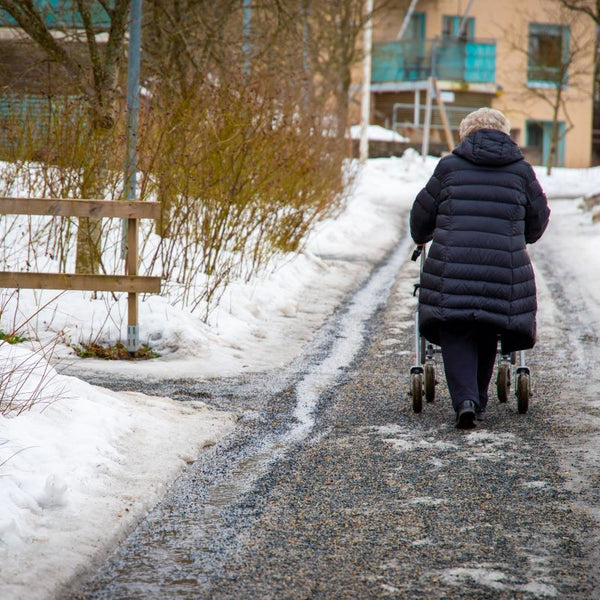As our parents age or suffer from health conditions, they may need more support to remain independent and the level of care they require can increase. Although we love our parents, being a family carer can be difficult and emotional. It may not be a role that we expected or have planned for. It’s therefore no surprise that providing care can be a source of conflict within families, particularly between siblings. There are often common themes stemming from emotional, logistical and financial challenges that lead to conflict, as well as past and present family dynamics.
Often the role of primary carer falls to women or whoever lives closest, which can lead to resentment and communication challenges. However, when it comes to caring for loved ones, families need to accept there will be differences in opinions and perceptions, and come together to provide the best possible care in the circumstances.
In this guide, we look at how families can resolve conflict and support each other.
Our research shows that almost half of people say they are “afraid” to talk to their elderly relatives about their care needs. One in four admit they avoid the conversation in case they upset or offend their parents. Our personalised advice can help you have an open and honest discussion about care options before it is too late.
Jump to:
- Causes of conflict when caring for ageing parents
- Tips to communicate clearly between family members and carers
- Financial considerations
- How to develop a family care plan
Causes of conflict when caring for ageing parents
Some of the common causes of sibling conflicts in caregiving are unequal workloads, financial responsibilities, and differing opinions on care decisions. Being aware of typical causes of disagreements can help you resolve or avoid conflict:
Sibling dynamics and family roles
Relationships and history play a big part in family dynamics. There may be long-standing sibling issues that are unresolved such as perceived favouritism and childhood rivalries. Stressful situations can bring these issues to a head, affecting decision-making and cooperation.
Personality clashes and different communication styles can also affect the situation, even if relationships are normally good. One sibling may be more proactive than another. Procrastination or conflicting priorities can cause frustration, even when both parties have their parents’ best interests at heart.

Unequal caring responsibilities
One sibling will often take a more active and involved role than the other. Sometimes this is inevitable and unavoidable, for example, if one lives nearby. In other instances, one child may be more willing to help or they have a closer relationship with their parent. Commitments such as work and young children also affect how the burden is shared.
Whatever the reason, it can lead to feelings of resentment and burnout that are amplified during emotional times.
If someone has been a family carer for many years then they may have made considerable personal sacrifices, including career and salary, relationships and free time. The responsibility of being a carer can impact health too, both physical and mental.
Different perceptions
Families may not agree on what level of care is required. There may not be a right answer to what the most suitable care solution is, however, siblings may be influenced by their fears for their parents or financial worries about the cost of care.
If one sibling has not seen their parents for a while, they may perceive a greater deterioration in health and wellbeing than someone who sees them regularly. It may be difficult to accept that a loved one needs extra support and some family members may be in denial.
Financial contributions and concerns
Paying for care is a common source of conflict. If one sibling is not as involved as other family members, they may not be aware of the costs of care. Siblings may have different financial situations, with one better off than the other. There can be conflict over how to manage their parent’s finances and how much control and independence a parent should maintain. The use of parents’ savings or the sale of the family home to contribute to care costs can be an emotional as well as financial discussion. Read our tips for talking to elderly parents about their finances.
Communication challenges
Communication can be challenging even when people know each other well. Some people may prefer face-to-face talks or phone calls, others may feel more comfortable with email or group messages. Misunderstandings can easily arise due to a lack of clear communication or different styles, and this can cause conflict even when everyone has the same objective.
Who makes the decisions?
It is important for older adults to have a Power of Attorney agreement in place so there is clear direction over who should make financial decisions on their behalf. Without it, families may struggle to resolve different opinions on money, property and care. The older sibling or the one most directly involved with the care may feel they have the right to make decisions but legally this is not the case and other family members may feel differently. It can help to get organised with estate planning and wills.

Lack of support
A very common source of conflict is perceived lack of support from each other. This may be emotional support and time, as well as practical actions, and can lead to feelings of isolation and loneliness that contribute to stress. The primary caregiver may feel their efforts are not being recognised and feel overwhelmed by the care burden.
Data also reveals that 1 in 3 adults plan to give up work to care for their elderly parents when the time comes, with women aged 59 being the most common person to perform unpaid care roles. It’s therefore crucial that people are prepared to have conversations about care and their role in the future.
Source: Unpaid and Under Pressure: are Brits trapped caring for elderly parents
Tips to communicate clearly between family members and carers
One way to resolve conflict is to know how to have effective and open communication. This can mean putting emotional responses to one side to foster better cooperation and that can be easier to say than do.
Here are some top tips to resolve sibling conflict about caring for elderly parents:
1. Keep lines of communication open
If you are caring for an elderly parent, setting up a regular time to keep siblings up to date is a good way to avoid conflict and misunderstanding. There’s no right or wrong frequency – it could be weekly or once a fortnight, depending on what suits your family. Shared WhatsApp groups are also popular, however, often talking is better if everyone makes the time to do so.

It will give you an opportunity to share your concerns and discuss any changes before they become bigger issues. Shared calendars can coordinate carer visits and appointments and there are family carer apps that can help.
2. Use “I” statements
Try to express feelings and concerns without making your siblings feel defensive. If you frame the conversation around how you are feeling, rather than what your sibling is not doing then it won’t come across as critical. For example, “I feel overwhelmed with everything I had to do this week” rather than “You should have helped more this week”. Try to use neutral language that focuses on facts rather than emotional statements.
3. Listen and be patient
This can be difficult, particularly if you feel you need to get something off your chest. Active listening is a skill and requires us to give the person speaking our full attention, rather than thinking about what we want to respond with. The other person is likely to then feel their opinions and feelings are being taken into account. If your sibling is the primary carer then this is particularly important so they know their role is valued.
4. Establish ground rules
Personality clashes and different communication styles affect how we communicate. If both sides understand there should be no interrupting or personal attacks then conversations can focus on the main care issues, without spilling into arguments.
5. Focus on the shared goal of the best possible care
There may be times you disagree with each other but try to keep in mind the shared goal of ensuring your elderly parent’s wellbeing. Bringing the discussion back to this can de-escalate conflict and help everyone keep perspective.
6. Acknowledge each other's efforts
You can’t care for someone else if you are burnt out and you should try to maintain family relationships. Take the time to remain brothers or sisters and not solely family carers.
How to talk to Mum or Dad about care
Find out how you can #HaveTheTalk with your parents and get a personalised guide to discussing elderly care.

Financial considerations
Unfortunately, money is often the source of many conflicts and disagreements in families. As early as possible you should agree how to equally and fairly divide expenses and care duties. It may help to keep a list of costs with receipts and invoices.
Cost of care
Agree how care costs will be covered, for example by your parent’s savings or contributions from siblings. Many people are unaware of the costs of different options such as home care, assisted living and nursing homes until they are needed so it can help to do some research before.
Always consider your parent’s wishes. They may want to remain as independent as possible and to stay in the home they love. There are solutions to support their wishes, including home monitoring systems and personal alarms.
Management of property and finances
If your parents are fortunate enough to have some savings and investments, they may decide to fund some care support themselves. They may need some assistance to organise downsizing, managing investments or using their retirement savings. Read our advice on how to help older relatives organise finances for the future.
Family contributions
Talking about money is not easy and it is a sensitive subject. As well as discussing how to pay directly for some costs, such as carer visits or even a cleaner or gardener to help with the upkeep of the home, there will be indirect costs, such as taking time off work.
Benefits and tax considerations
Billions in elderly benefits and financial support goes unclaimed each year. There may be winter fuel payments, council tax support and pension credit that your parents are entitled to. If they need care or supervision because of an illness or a disability they may be eligible for Attendance Allowance.
Legal considerations when caring for an elderly parent
We have some useful guides that explain Power of Attorney and managing wills and estates. Although it is not something any of us like to think about, it is important to understand what you should do when someone dies.

How to develop a family care plan
A family care plan supports everyone involved in caring for their relative. It can be as formal or informal as you like and the level of detail will vary. Some people find it useful to write down what they have agreed and to include other useful information to share. A care plan can include details about:
- Medical conditions, prescriptions and regular appointments or visits. If one person is normally responsible for this, it can be useful to share information in case they go away or are unwell.
- Carer schedules. You can agree who is visiting or calling and when, so that your parent has regular company. You may find it useful to agree who is responsible for what, for example, one family member may be a DIY expert or gardener and more able to help with some tasks.
- Legal documents. Where documents like wills and power of attorney are kept and what insurance, savings and pensions your parents have
- Emergency contacts. A list of important contacts such as neighbours, GP and any special medical instructions are useful to have to hand in an emergency. If your loved one has a key safe, keep the key safe code secure and up-to-date. If they have a pendant alarm or fall alarm, list the alarm provider’s company name and contact details. At TakingCare Personal Alarms, we securely hold our customers medical information and emergency contacts to help us provide the best response in an emergency and ask our customers to let us know if these change.
Conclusion
The strength of having close family and working together can ease the often-challenging responsibility of care. Although disagreements may arise, these can be worked through with patience and shared understanding of your parents’ wishes. Ongoing dialogue and support are key.
You also may be unfamiliar with some of the challenges and care options available. We aim to provide our personal alarm customers and their families with telecare solutions that support independent living, as well as guides and resources for carers. Here are some of most popular guides for family carers:
- Psychologist tips for having conversations about care with your elderly parents
- Considerations before moving elderly parents into your home
- How to have the talk about elderly care earlier
- Spotlight on carers report





